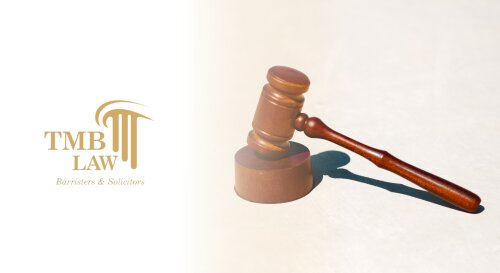Best Foreclosure Lawyers in Oshawa
Share your needs with us, get contacted by law firms.
Free. Takes 2 min.
Free Guide to Hiring a Real Estate Lawyer
List of the best lawyers in Oshawa, Canada
About Foreclosure Law in Oshawa, Canada
Foreclosure in Oshawa, Canada, is a legal process by which a lender attempts to recover the balance of a loan from a borrower who has stopped making payments. In Ontario, which includes Oshawa, the foreclosure process can lead to either the lender taking ownership of the property or the property being sold to repay the debt. This guide provides valuable information for those facing foreclosure or seeking legal advice in this area.
Why You May Need a Lawyer
Foreclosure is a complex and stressful process, and there are several situations where legal assistance may be necessary:
- Understanding Your Rights: Homeowners need to understand their legal rights and obligations during foreclosure proceedings.
- Negotiating with Lenders: Lawyers can assist in negotiating repayment plans or loan modifications to avoid foreclosure.
- Legal Representation: During court proceedings or arbitration, having a legal advocate can protect your interests.
- Reviewing Documentation: Ensuring all foreclosure documents are in order and correctly interpreted.
- Avoiding Fraud: Legal professionals can identify and protect against potential fraud or unfair practices by lenders.
Local Laws Overview
Several key aspects of local laws are particularly relevant to foreclosure in Oshawa, Canada:
- Power of Sale vs. Foreclosure: In Ontario, lenders more commonly use a "power of sale" to sell a property and recover debts than the judicial foreclosure process.
- Notice of Sale: If a borrower defaults, the lender must provide a Notice of Sale, which gives the borrower a certain period to rectify the default before the lender can proceed with selling the property.
- Redemption Period: Borrowers have the opportunity to repay the overdue amounts to reinstate the mortgage during the redemption period.
- Equity of Redemption: Borrowers have the right to pay the full debt and halt the foreclosure process at any time before the property is sold.
Frequently Asked Questions
What is foreclosure?
Foreclosure is the legal process by which a lender attempts to recover the balance of a loan from a borrower who has stopped making payments, typically by forcing the sale of the asset used as collateral.
What is a power of sale?
A power of sale allows the lender to sell the property used as collateral for the defaulted loan without having to go through the court system, which is quicker and less costly than foreclosure.
What notice must a lender provide before foreclosure proceedings?
In Ontario, lenders must provide a Notice of Sale that outlines the borrower’s default and the lender’s intention to sell the property if the default is not cured.
How long do I have to respond to a Notice of Sale?
Typically, you have 35 days from the date of the Notice of Sale to either cure the default or negotiate with the lender.
Can I stop a foreclosure?
Yes, you can stop a foreclosure by paying off the default amount, negotiating a new payment plan, or sometimes refinancing the loan.
What happens if my property is sold in a foreclosure?
If your property is sold, the proceeds will first go toward paying the outstanding loan balance and any associated legal costs. Any remaining amount will be returned to you.
What is a deficiency judgment?
A deficiency judgment is a court order that makes you personally responsible for any remaining debt if the sale of your property does not cover the full loan balance.
Can a lawyer help me keep my home?
Yes, a lawyer can negotiate with your lender on your behalf, potentially arranging a payment plan or loan modification to help you keep your home.
Do I need to appear in court for a foreclosure?
Not necessarily. If a power of sale is being used, court appearances are typically not required. However, if judicial foreclosure proceedings are initiated, you may need to appear in court.
What is the cost of hiring a lawyer for foreclosure issues?
Legal fees vary widely depending on the complexity of the case and the lawyer's experience. Some offer initial consultations at a reduced fee or even for free. It is important to discuss fees upfront during your first meeting.
Additional Resources
Several resources and organizations can provide further assistance and information:
- Ontario Ministry of Government and Consumer Services: Provides information on your legal rights and consumer protection.
- Legal Aid Ontario: May offer assistance if you qualify financially.
- Durham Region Legal Clinic: Provides free legal services to low-income residents of Oshawa.
- Oshawa Public Library: Offers various resources, including information on local legal support services.
Next Steps
If you need legal assistance with foreclosure, here are some steps you can take:
- Gather Documentation: Collect all relevant documents, including your mortgage agreement, any correspondence from your lender, and notices of sale.
- Seek Legal Consultation: Contact a lawyer specializing in foreclosure law to discuss your situation and explore your options.
- Negotiate with Lenders: With legal assistance, negotiate repayment plans or loan modifications to avoid foreclosure.
- Utilize Resources: Leverage the resources and organizations mentioned above for additional support.
- Stay Informed: Keep yourself informed about your rights and any developments in foreclosure laws and regulations in Ontario.
Taking these steps can help you effectively navigate the foreclosure process and protect your interests.
Lawzana helps you find the best lawyers and law firms in Oshawa through a curated and pre-screened list of qualified legal professionals. Our platform offers rankings and detailed profiles of attorneys and law firms, allowing you to compare based on practice areas, including Foreclosure, experience, and client feedback.
Each profile includes a description of the firm's areas of practice, client reviews, team members and partners, year of establishment, spoken languages, office locations, contact information, social media presence, and any published articles or resources. Most firms on our platform speak English and are experienced in both local and international legal matters.
Get a quote from top-rated law firms in Oshawa, Canada — quickly, securely, and without unnecessary hassle.
Disclaimer:
The information provided on this page is for general informational purposes only and does not constitute legal advice. While we strive to ensure the accuracy and relevance of the content, legal information may change over time, and interpretations of the law can vary. You should always consult with a qualified legal professional for advice specific to your situation.
We disclaim all liability for actions taken or not taken based on the content of this page. If you believe any information is incorrect or outdated, please contact us, and we will review and update it where appropriate.










